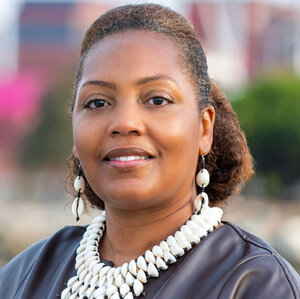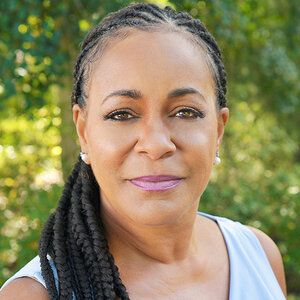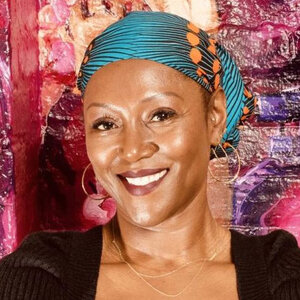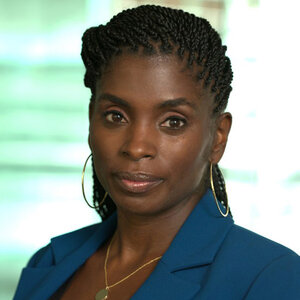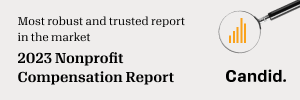Marc Philpart, Executive Director, California Black Freedom Fund: Support for Black power building
September 8, 2023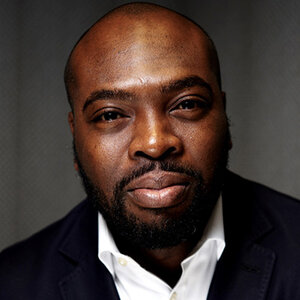
Marc Philpart was named executive director of the California Black Freedom Fund (CBFF) after more than a decade of leadership in advocacy and working with grassroots organizations to build power for racial justice.
Before joining CBFF, he led the Alliance for Boys and Men of Color, where he advanced more than 100 state policies and established partnerships with the California Senate and Assembly Select Committees on the Status of Boys and Men of Colorand the California Funders for Boys and Men of Color. Under his leadership, the alliance broadened its focus to include fighting for gender justice and ending intimate partner violence by addressing misogyny and patriarchy as well as racial equity.
Philpart’s campaign and policy expertise extends to issues including public health and violence prevention, police and prison abolition, education, the criminalization of youth, economic equity, poverty eradication, and voting and civic engagement. He serves on the boards of the Schott Foundation for Public Education and California Immigrant Policy Center, Partners for Dignity and Rights and is on an advisory committee for the University of Southern California’s Equity Research Institute.
PND spoke with Philpart about the needs of Black-led organizations, how sustained multiyear funding plays a part, and what philanthropy needs to consider when working with the Black community.
Philanthropy News Digest: The California Black Freedom Fund (CBFF) is the first-of-its-kind fund co-created with Black leaders and organizers. Why is a fund of this type needed in the philanthropic landscape?
Marc Philpart: This fund is important because it’s helping fill gaps that traditional philanthropy has failed to address. Movement organizers and community members have specifically called for philanthropy to be responsive in this moment and for the long term. CBFF is focused on scaling Black power building infrastructure, which means supporting networks, organizations, and leaders along with providing the tools and resources necessary to sustain their work. Our funding and support aim to dismantle anti-Black systemic racism and elevate the leaders and solutions that our communities need.
PND: As CBFF’s first executive director, what are your goals for the organization? How can they be supported? Who are you looking to partner with?
MP: There are a number of goals we are working towards, including creating an independent organization. CBFF was launched as a five-year initiative within the Silicon Valley Community Foundation, and I’m excited about our independent spinoff to become the Black Freedom Fund. We realized that in order to solve inter-generational problems, we need durable, permanent organizations and not initiatives. We’re building the philanthropic institution our communities need with the Black Freedom Fund. We want to continue raising resources to establish an endowment, expand our grantmaking to support more Black-led and -serving networks and grassroots organizations, and deepen our civic engagement and power-building infrastructure with our partners across the state.
We need support from foundations, donors, corporations, and lawmakers throughout California to help us achieve these goals. Right now, we’re actively seeking support for our #FundBlackFreedom state budget campaign, which is an easy way for folks to lend their voice and influence by signing on to a letter of support. We also host in-person and virtual briefings for funders and partners to learn more about timely issues our grantees are facing and amplify opportunities to get involved.
PND: How have your past leadership roles with Alliance for Boys and Men of Color and in developing the Obama administration’s My Brother’s Keeper initiative prepared you for your current position with CBFF?
The solutions to the systemic inequities that diminish our power are held in our communities. Through this fund, our movements will have the resources needed to realize our collective vision of Black liberation.
MP: My past experience with Alliance for Boys and Men of Color and My Brother’s Keeper led me to understand that this work needed to be a multi-sectoral effort and that state lawmakers have just as much skin in the game regarding realizing racial justice. Coming to CBFF was a unique opportunity because, for the first time in California, Black community organizing, advocacy, and leadership have dedicated investment and attention. The solutions to the systemic inequities that diminish our power are held in our communities. Through this fund, our movements will have the resources needed to realize our collective vision of Black liberation.
PND: CBFF launched a five-year initiative to raise and distribute $100 million so that California’s growing ecosystem of locally rooted, Black-led organizing efforts have the sustained investments and resources they need to eradicate systemic and institutional racism. Where does the initiative stand now? Are there any updates on fundraising and/or allocation of funds?
MP: CBFF has awarded nearly $35 million in grants over six funding rounds. We have allocated over $20 million to bolster three well-established statewide networks, each with long-term working relationships with more than 50 Black-led organizations. CBFF has awarded almost $15 million to 100 Black-led and serving organizations across California, and we are expected to award another $3 million in our seventh round of funding this September.
Our grantmaking generally consists of multiyear, unrestricted, general support grants, and we’re incredibly proud of the range of organizations we’ve been able to resource. We primarily support smaller organizations, and almost 90 percent of our community partners have budgets under $1 million. Geographically, we grant across the state, including metropolitan areas with large Black populations like Los Angeles and Oakland, regions with emerging Black communities like the Inland Empire and Central Valley, and Black communities with growing numbers due to push out from major metros like those in the deep East Bay and the counties surrounding Sacramento in the Capitol Region.
PND: When discussing Black philanthropy, the need for sustained multiyear giving has been identified as a specific component and “the urgency of now” concerning making long-term changes to institutional philanthropy. How will CBFF work to that end?
MP: CBFF is catalyzing a strengthened ecosystem of networks and organizations working to protect progress in California’s Black community and create real change in our culture, policy, and systems. We continue to uplift the strength and power of leaders and organizations working to advance a self-determined future where Black people thrive, and educate and organize the philanthropic sector to transform the relationship between funders and the Black community.
With that in mind, our commitment to institutions matters much more than adhering to specific grant cycles. While all of our grants to organizations are multiyear (with an average of two years), CBFF wants to stay connected to organizations for as long as we can, which is hard because we don’t always have the funding to do so. Despite that, there’s a way to stay committed to an institution for a long period of time that goes beyond grantmaking, such as hosting or co-sponsoring events, coalition building, introducing groups to additional sources of funding, partnering to build much-needed field infrastructure, and participating in briefings or educational opportunities. We’re using all of those tools. We also try to encourage the funders who support us to make the same commitment to flexible and long-term relationships with community partners. CBFF only exists because a critical mass of funders came together and made five-year commitments to support and grow this institution. We encourage our funders to extend the same commitment to all community partners.
Our giving needs to be more than a flashy moment so that organizations can actually plan for years in advance and know they have the support they need to sustain their operations, their people and their programs.
I would love to see more serious commitments to double down on race-based grantmaking in the face of racial terror, which we’ve seen from recent events like the dismantling of affirmative action and the attacks on Fearless Fund. Our giving needs to be more than a flashy moment so that organizations can actually plan for years in advance and know they have the support they need to sustain their operations, their people, and their programs.
PND: 2023’s Black Philanthropy Month’s theme was “Love In Action: Black Giving Worlds.” One question it asks is: What would philanthropy look like if the love of all humanity, including Black people, drove it? How would you answer this question?
MP: If we truly loved all of humanity, philanthropy wouldn’t be necessary, and it certainly wouldn’t be necessary to have to encourage philanthropy to support justice for Black people. The reality is our country has never lived up to its ideals, so the need for, and very existence of, philanthropy is a symbol of our society’s failings and the fact that philanthropy shortchanges Black communities shows how it is a microcosm of society’s inequities. Looking ahead, we’re invested in building Black power and permanence. With the Black Freedom Fund, we’re creating a Black-led institution that we hope can change the face and approach of philanthropy and, by extension, fuel the organizations that are working to change our world.
The reality is our country has never lived up to its ideals, so the need for, and very existence of, philanthropy is a symbol of our society’s failings and the fact that philanthropy shortchanges Black communities shows how it is a microcosm of society’s inequities.
PND: California has emerged as a potential leader in reparations for the legacy of slavery due to the work of the California Task Force to Study and Develop Reparation Proposals for African Americans, how would the possibility of reparations in the state of California impact or intersect with CBFF’s work?
MP: It’s interesting because the work of CBFF should not supplant or replace the important demands made in the final report from the reparations taskforce. The taskforce’s final report, California Task Force to Study and Develop Reparation Proposals for African Americans, includes a recommendation to invest in organizations like CBFF and other partners that support voting and civic engagement in the Black community so there is very obvious alignment.
You could argue that philanthropy is seeking to repair the harm that has been done to our communities and move towards a system of justice and equity.
PND: As we’ve seen in current events, like the recent decision by the U.S. Supreme Court to “roll back progress on equity in education,” as you put it in your response to the ruling on affirmative action, how have efforts like these to curb Black liberation impacted CBFF’s strategies and your leadership of the organization?
MP: We’re not going to stop being unapologetic about the importance and urgency of investing in Black power building, communities, and solutions. We’re going to continue investing in the movement infrastructure needed to win change and prioritize racial justice.
Black Freedom Fund is and always will be sharply focused on lifting up Black communities, even in this anti-Black climate. Our grantmaking approach includes multiyear awards for general operating support for all of our community partners in order to be flexible and effective.
During the racial reckoning that swept the nation in 2020, Black-led philanthropy achieved renewed prominence in the philanthropic sector and national spotlight. As a Black-led fund, we provide an indispensable resource to many donors and traditional funders who are constrained by institutional limitations but still want to drive transformation. We’re committed to protecting that progress and deepening partnerships with traditional philanthropy. These partnerships are essential for enabling Black-led funds and the communities they serve to access the full range of resources required for us to invest deeply in the movements and organizations driving change.
Lauren Brathwaite is content editor at Philanthropy News Digest.


